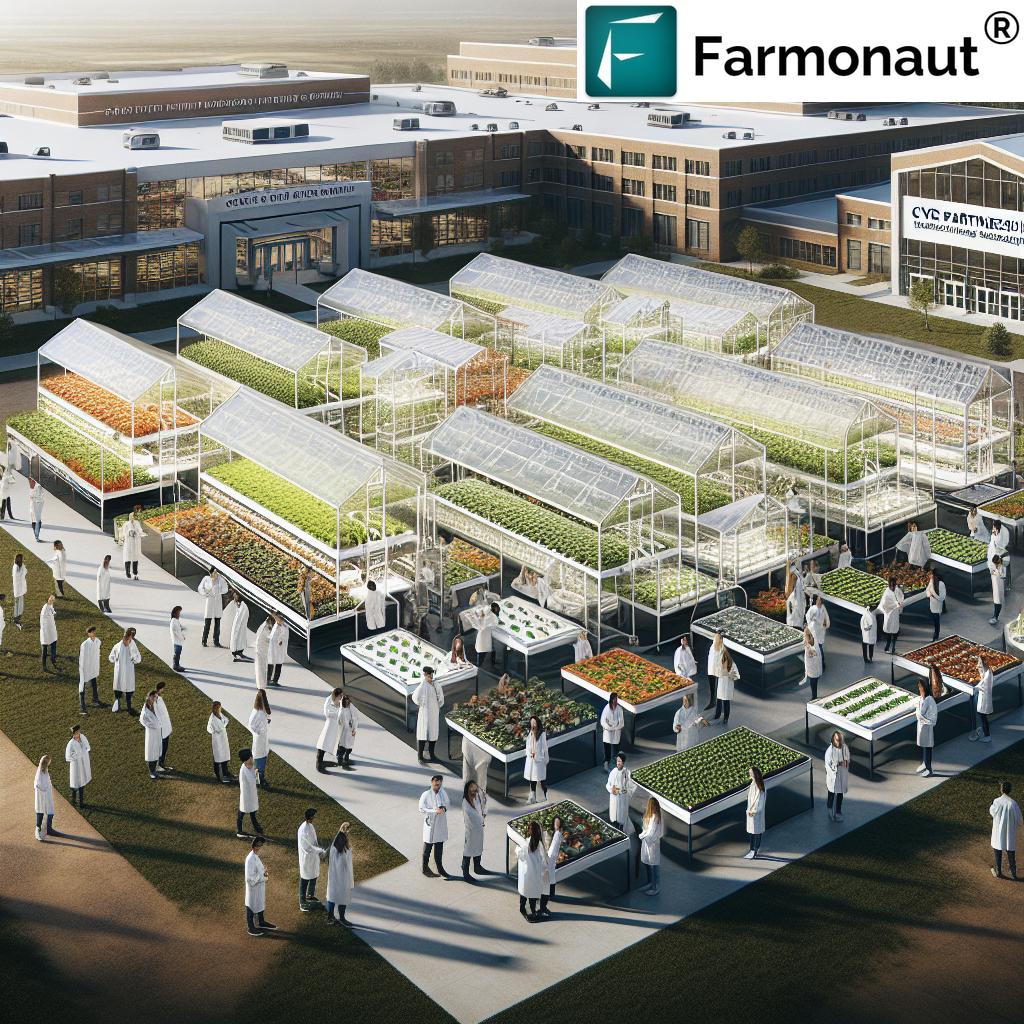Revolutionize High School: Unleash Sustainable Farming with Hydroponic Towers and College Credits
GLENWOOD CITY, Wisconsin – In a groundbreaking move that’s set to transform agricultural education, Glenwood City High School has launched an innovative program combining high school hydroponic farming with college credit agriculture courses. This initiative not only introduces students to cutting-edge urban farming technology but also provides them with a head start on their higher education journey.

Bridging High School and College: A New Era in Agricultural Education
The agricultural education program at Glenwood City High School has taken a significant leap forward this year. Students now have the opportunity to enroll in three approved courses that offer both high school credit and valuable college credits. This innovative approach to education is bridging the gap between secondary and post-secondary learning, providing students with a unique advantage as they prepare for their future careers.
One of the standout offerings in this program is a high school horticulture course taught by Miss Konder. Upon successful completion, students will earn three credits from Chippewa Valley Technical College (CVTC). This partnership between the high school and CVTC is a game-changer for students interested in pursuing agriculture and horticulture at the college level.
Miss Konder enthusiastically shares, “It is a wonderful opportunity that our students have to gain college credits before they even graduate from high school. They will gain valuable knowledge and skills but also save thousands of dollars on their post-secondary education.”
Introducing Fork Farm Hydroponic Technology
As part of the CVTC partnership, Glenwood City High School received a free Fork Farm hydroponic tower. This state-of-the-art equipment is at the forefront of vertical farming technology and represents a significant step towards implementing sustainable agriculture in schools.
The Fork Farm hydroponic tower utilizes water-based growing techniques to produce fresh lettuce and herbs. This produce will be incorporated into the school lunch program and used in the Family and Consumer Sciences (FACS) and agriculture classrooms, providing students with hands-on experience in sustainable food production.

Vertical Farming: A Global Movement
Vertical farming is gaining traction worldwide as a solution to the challenges posed by increasing global population and diminishing farmable land due to urbanization. By introducing Fork Farm hydroponic technology into the classroom, Glenwood City High School is preparing students for the future of agriculture.
Students in the horticulture class will have the opportunity to learn about innovative farming techniques, specifically focusing on hydroponics and the Fork Farm system. This hands-on experience with urban farming techniques for students will give them a competitive edge in the rapidly evolving field of agriculture.
Benefits of High School Hydroponic Farming
- Practical experience with cutting-edge agricultural technology
- Understanding of sustainable farming practices
- Exposure to potential career paths in agriculture and horticulture
- Development of problem-solving and critical thinking skills
- Contribution to the school’s sustainability efforts
The Fork Farm hydroponic tower can grow up to 288 plants simultaneously, providing students with ample opportunities to experiment with different crops and growing conditions. This hands-on experience is invaluable for students interested in pursuing careers in agriculture, environmental science, or related fields.
Innovative Agricultural Education Programs: A Model for the Future
Glenwood City High School’s approach to agricultural education serves as a model for other schools looking to implement innovative agricultural education programs. By combining traditional classroom learning with hands-on experience and college credit opportunities, the school is preparing students for success in both higher education and the workforce.
The integration of hydroponic farming and vertical farming education into the curriculum reflects the changing landscape of agriculture. As the world faces challenges related to food security and environmental sustainability, programs like this are essential in equipping the next generation of farmers and agricultural professionals with the skills they need to address these issues.
For those interested in implementing similar programs or exploring advanced agricultural technologies, consider checking out the Farmonaut app:
The Future of Sustainable Agriculture in Schools
The implementation of sustainable agriculture in schools through programs like the one at Glenwood City High School is a trend that is likely to continue growing. These initiatives not only provide valuable educational experiences but also contribute to broader sustainability goals within the community.
Some potential future developments in this area could include:
- Expansion of hydroponic farming to other schools in the region
- Integration of other sustainable farming techniques, such as aquaponics
- Partnerships with local restaurants or farmers’ markets to sell student-grown produce
- Development of community education programs centered around sustainable agriculture
- Incorporation of data analysis and technology in agricultural education
For those interested in exploring agricultural technology further, Farmonaut offers a range of tools and resources:
API: https://sat.farmonaut.com/api
API Developer Docs: https://farmonaut.com/farmonaut-satellite-weather-api-developer-docs/
Conclusion: Nurturing the Next Generation of Agricultural Innovators
The innovative program at Glenwood City High School represents a significant step forward in agricultural education. By combining high school hydroponic farming with college credit agriculture courses, the school is providing students with a unique and valuable educational experience that prepares them for the future of farming.
As we face global challenges related to food production and environmental sustainability, programs like this play a crucial role in nurturing the next generation of agricultural innovators. By exposing students to urban farming technology and innovative farming techniques, we are equipping them with the tools and knowledge they need to tackle these challenges head-on.
The success of this program at Glenwood City High School serves as an inspiration and a model for other schools looking to implement similar initiatives. As we move forward, it’s clear that the integration of technology, sustainability, and hands-on learning will be key to preparing students for careers in agriculture and related fields.
To stay updated on the latest developments in agricultural technology and sustainable farming practices, download the Farmonaut app:
As we continue to explore new frontiers in agricultural education and sustainable farming practices, programs like the one at Glenwood City High School will play a crucial role in shaping the future of agriculture. By combining traditional knowledge with cutting-edge technology and a focus on sustainability, we can ensure that the next generation of farmers and agricultural professionals are well-equipped to meet the challenges of tomorrow.


